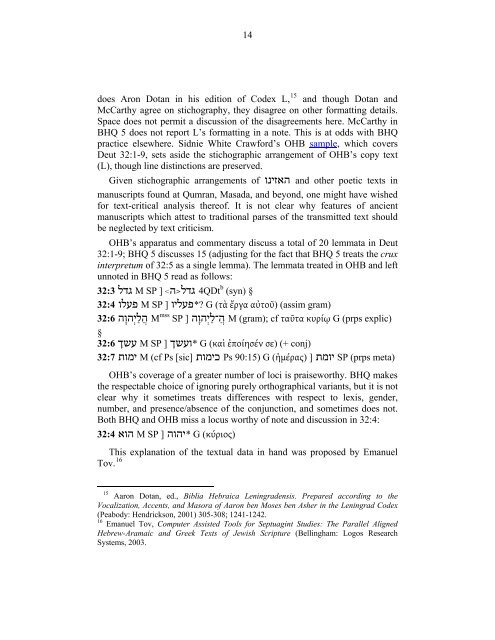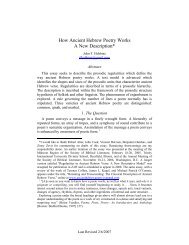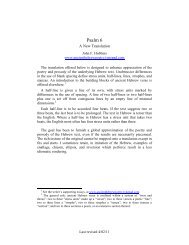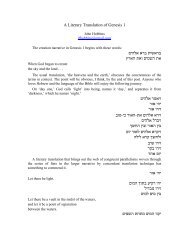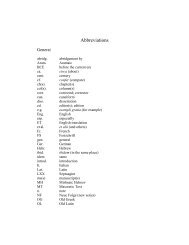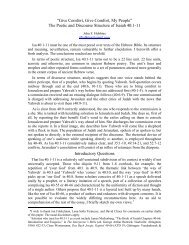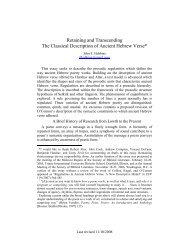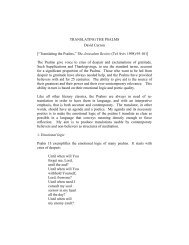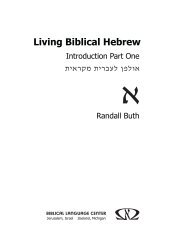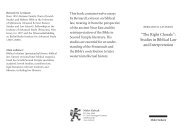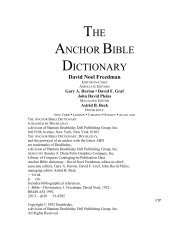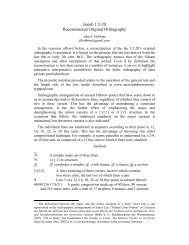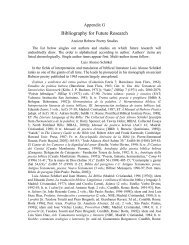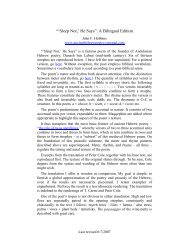Whither Biblia Hebraica Quinta - Ancient Hebrew Poetry
Whither Biblia Hebraica Quinta - Ancient Hebrew Poetry
Whither Biblia Hebraica Quinta - Ancient Hebrew Poetry
- No tags were found...
You also want an ePaper? Increase the reach of your titles
YUMPU automatically turns print PDFs into web optimized ePapers that Google loves.
14does Aron Dotan in his edition of Codex L, 15 and though Dotan andMcCarthy agree on stichography, they disagree on other formatting details.Space does not permit a discussion of the disagreements here. McCarthy inBHQ 5 does not report L’s formatting in a note. This is at odds with BHQpractice elsewhere. Sidnie White Crawford’s OHB sample, which coversDeut 32:1-9, sets aside the stichographic arrangement of OHB’s copy text(L), though line distinctions are preserved.Given stichographic arrangements of האזינו and other poetic texts inmanuscripts found at Qumran, Masada, and beyond, one might have wishedfor text-critical analysis thereof. It is not clear why features of ancientmanuscripts which attest to traditional parses of the transmitted text shouldbe neglected by text criticism.OHB’s apparatus and commentary discuss a total of 20 lemmata in Deut32:1-9; BHQ 5 discusses 15 (adjusting for the fact that BHQ 5 treats the cruxinterpretum of 32:5 as a single lemma). The lemmata treated in OHB and leftunnoted in BHQ 5 read as follows:§ (syn) 4QDt b גדל ] SP M גדל 32:3gram) G (τὰ ἔργα αὐτοῦ) (assim ?*פעליו ] SP M פעלו 32:4explic) M (gram); cf ταῦτα κυρίῳ G (prps ה־ֲ ההָו ] SP M mss הֲ ההָו 32:6§conj) G (καὶ ἐποίησέν σε) (+ *ועשך ] SP M עשך 32:6meta) SP (prps יומת ] (ἡμέρας) Ps 90:15) G כימות [sic] M (cf Ps ימות 32:7ַל ְיַל ְיOHB’s coverage of a greater number of loci is praiseworthy. BHQ makesthe respectable choice of ignoring purely orthographical variants, but it is notclear why it sometimes treats differences with respect to lexis, gender,number, and presence/absence of the conjunction, and sometimes does not.Both BHQ and OHB miss a locus worthy of note and discussion in 32:4:(κύριος) G *יהוה ] SP M הוא 32:4This explanation of the textual data in hand was proposed by EmanuelTov. 1615Aaron Dotan, ed., <strong>Biblia</strong> <strong>Hebraica</strong> Leningradensis. Prepared according to theVocalization, Accents, and Masora of Aaron ben Moses ben Asher in the Leningrad Codex(Peabody: Hendrickson, 2001) 305-308; 1241-1242.16 Emanuel Tov, Computer Assisted Tools for Septuagint Studies: The Parallel Aligned<strong>Hebrew</strong>-Aramaic and Greek Texts of Jewish Scripture (Bellingham: Logos ResearchSystems, 2003.


